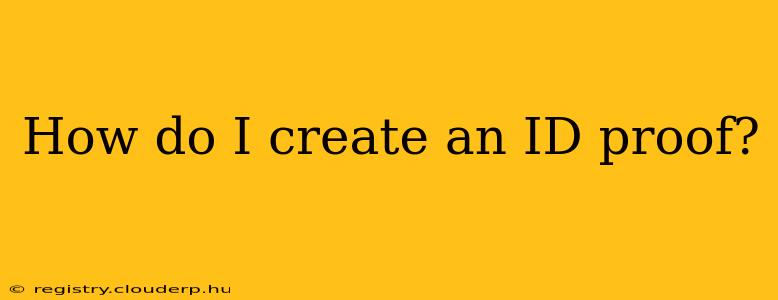Creating an "ID proof" isn't about fabricating a document; it's about obtaining official identification issued by a recognized authority. Legitimate identification is crucial for various life aspects, from opening a bank account to traveling internationally. This guide will clarify the process of obtaining official identification, emphasizing the importance of legality and avoiding fraudulent activities.
Understanding the Purpose of ID Proof
Before delving into the specifics, it's crucial to understand why ID proof is necessary. It verifies your identity, preventing fraud and ensuring accountability. Different situations require different levels of verification, ranging from a simple driver's license for picking up a package to a passport for international travel.
What Types of ID Proof Are Available?
Several types of ID proof exist, each serving a different purpose and offering varying levels of verification:
-
Government-Issued IDs: These are the most widely accepted forms of identification and include:
- Passport: A passport is an internationally recognized travel document and is arguably the strongest form of ID.
- Driver's License: Issued by state or local motor vehicle departments, this proves your identity and driving privileges.
- National Identity Card: Many countries issue national identity cards, serving as a primary form of identification. (e.g., Aadhaar card in India)
- State-Issued ID Card: Some states offer non-driver identification cards for residents without a driver's license.
-
Other Forms of Identification: While not as widely accepted as government-issued IDs, these can sometimes be used as supporting documentation:
- Voter Registration Card: This proves your registration to vote in your area.
- Utility Bills (with your name and address): These can serve as proof of address, but not identity on their own.
- Bank Statements (with your name and address): Similar to utility bills, these can confirm your address but not solely verify your identity.
How Do I Obtain a Government-Issued ID?
The process for obtaining a government-issued ID varies depending on the specific document and your location. Generally, you'll need to:
- Meet Eligibility Requirements: This may include age restrictions, residency requirements, or other criteria specific to the ID type.
- Gather Necessary Documents: You will typically need proof of your identity, address, and sometimes other supporting documentation.
- Complete an Application: This often involves filling out forms and providing biometrics (fingerprints, photos).
- Pay Applicable Fees: There are usually fees associated with obtaining government-issued IDs.
- Schedule an Appointment (if required): Depending on the issuing authority, you may need to schedule an appointment.
What if I've Lost or Damaged My ID?
If your ID is lost or damaged, you'll need to report it to the issuing authority (e.g., the Department of Motor Vehicles for a driver's license) and apply for a replacement. This typically involves providing proof of identity and paying a fee.
Is it Legal to Create a Fake ID?
Creating or possessing a fake ID is illegal and carries serious consequences. Penalties can include hefty fines, imprisonment, and a criminal record. It's crucial to always obtain identification through legal channels.
Can I Use My ID for Everything?
While government-issued IDs are widely accepted, certain situations may require additional forms of verification. For example, some businesses may request additional documentation to verify your address or identity beyond a single ID.
What Happens if I Don't Have an ID?
Lack of proper identification can significantly limit your ability to access various services and opportunities. It's crucial to obtain a government-issued ID as soon as possible to avoid such limitations.
This guide provides a general overview. The specific requirements and procedures for obtaining identification will vary depending on your location and the type of ID you need. Always refer to the official website of your local government agencies for accurate and up-to-date information. Remember, obtaining official identification through legal channels is the only responsible and acceptable way to establish your identity.

